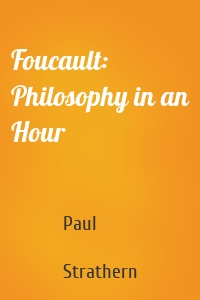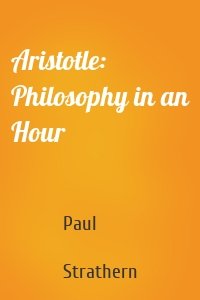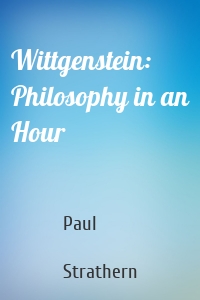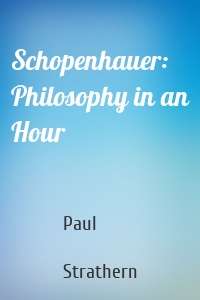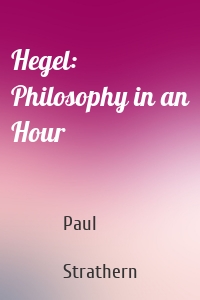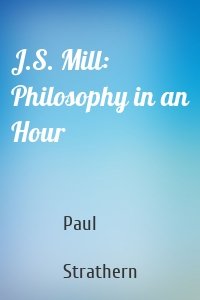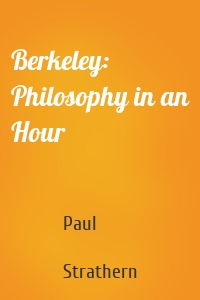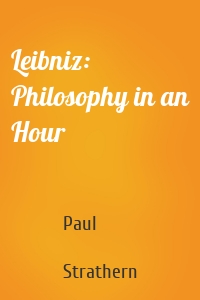Paul Strathern
103 кн.
Foucault: Philosophy in an Hour
Philosophy for busy people. Read a succinct account of the philosophy of Foucault in just one hour.The French philosopher Michel Foucault set about his task rather like a historian. After painstaking research, he concluded that knowledge and power were intimately related throughout history. He illustrated this central idea of his philosophy through studies of madness, sexuality, and discipline and punishment, arguing that there is no such thing as absolute truth, only different truths about...
| Автор | Paul Strathern |
Aristotle: Philosophy in an Hour
Philosophy for busy people. Read a succinct account of the philosophy of Aristotle in just one hour.The philosophy of Aristotle dominated Western thought for over a thousand years. He had a mind that mastered all disciplines from mathematics to politics and had a continuing impact on every sphere of knowledge he touched. Above all, Aristotle is credited with the founding of logic. He divided human knowledge into separate categories, and enabled our understanding of the world to develop in a...
| Автор | Paul Strathern |
Wittgenstein: Philosophy in an Hour
Philosophy for busy people. Read a succinct account of the philosophy of Wittgenstein in just one hour.Ludwig Wittgenstein saw himself as ‘the last philosopher’. In his view, philosophy in the traditional sense was finished. A superb logician, Wittgenstein distrusted language and sought to solve the problems of philosophy by reducing them to the purest form of logic. Everything else – metaphysics, aesthetics, ethics, finally even philosophy itself – was excluded. He famously stated, ‘of that...
| Автор | Paul Strathern |
Schopenhauer: Philosophy in an Hour
Philosophy for busy people. Read a succinct account of the philosophy of Schopenhauer in just one hour.Arthur Schopenhauer, the ‘philosopher of pessimism,’ makes it clear that he regards the world and our life in it as a bad joke. However, if the world is indifferent to our fate it doesn’t thwart us deliberately – its façade is supported by what Schopenhauer calls the universal Will. He saw this as a force that is blind and without purpose, bringing on all our misery and suffering. Schopenhauer...
| Автор | Paul Strathern |
Hegel: Philosophy in an Hour
Philosophy for busy people. Read a succinct account of the philosophy of Hegel in just one hour.With Hegel philosophy became very difficult indeed – even the great man himself conceded that ‘only one man understands me, and even he does not.’ His dialectical method produced the most grandiose metaphysical system known to humanity, and included absolutely everything, its most vital element being the dialectic of the thesis, antithesis and synthesis. This method arose from Hegel’s ambition to...
| Автор | Paul Strathern |
J.S. Mill: Philosophy in an Hour
Philosophy for busy people. Read a succinct account of the philosophy of J.S. Mill in just one hour.John Stuart Mill is remembered today as the leading exponent of Utilitarianism, arguing that our aim in life must be the attainment of pleasure and the minimizing of pain for the majority of people. The principle that lies at the heart of Utilitarianism is ‘the greatest benefit of the greatest number’ – an idea that perhaps seems self-evident today but one that was seen as radical within Mill’s...
| Автор | Paul Strathern |
Berkeley: Philosophy in an Hour
Philosophy for busy people. Read a succinct account of the philosophy of Berkeley in just one hour.Berkeley’s philosophy denies the existence of matter. According to his work, there is no material world, only our own experience. So when you don’t see something, it isn’t there. Then how does the world persist? Because it is supported by the continuous perception of an all-seeing God. Berkeley’s ideas appear to take empiricism to a ludicrous extreme. But is this quite so absurd as it seems? We are...
| Автор | Paul Strathern |
Leibniz: Philosophy in an Hour
Leibniz was the first great German philosopher to produce an all-embracing philosophical system. He came to the remarkable conclusion that space and time do not exist – they are mere superstitious assumptions. Only things exist and only God is able to see things as they truly are – from a perspectiveless viewpoint. Yet the infinite of ultimate objects that make up the world (‘monads’) are not material: they are metaphysical and thus not subject to the laws of cause and effect. Their apparent...
| Автор | Paul Strathern |









